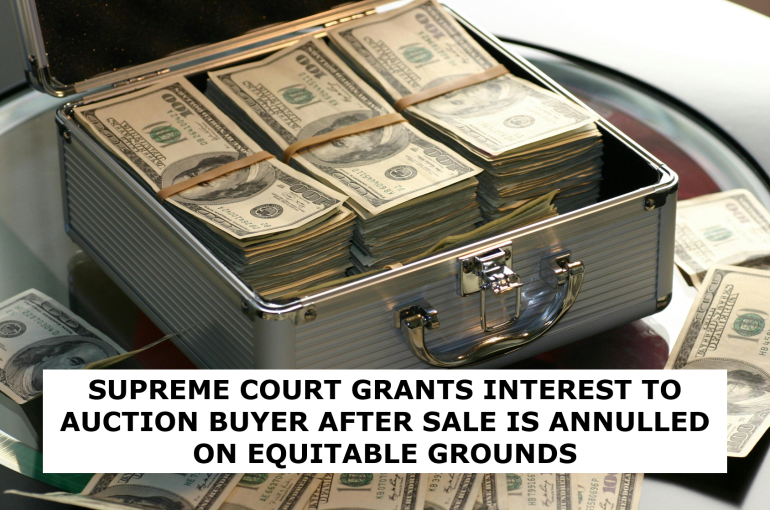SUPREME COURT GRANTS INTEREST TO AUCTION BUYER AFTER SALE IS ANNULLED ON EQUITABLE GROUNDS
A double Bench of the Supreme Court comprising of Justice Abhay S. Oka and Justice Ujjal Bhuyan passed a Judgment dated 18-10-2024 in the matter of Salil R. Uchil vs. Vishu Kumar & Ors, Civil Appeal No. 11693 of 2024 and observed that the importance of fairness in legal proceedings, noting that while the High Court has the discretion to set aside an auction sale on equitable grounds, such decisions should not place an undue burden on innocent parties. By awarding the Appellant interest on the amount he had deposited, the Supreme Court ensured he received fair compensation for the financial loss he suffered due to the lengthy legal process, despite not being at fault.
FACTS:
- That the aforesaid Appeal was filed before the Apex Court by one, Salil R. Uchil (Appellant) against one, Vishnu Kumar, one Harish Kumar, the Asst. Registrar of Co-Operative Societies and Recovery Officer, the Bhagavathi Co-Operative Bank Ltd & Ors. (Respondents), who challenged the decision of the Hon’ble High Court of Karnataka, Bengaluru (High Court) which, vide, Order dated 17.03.2022 set aside the Auction Sale in favour of the Appellant, ruling that the Respondent No. 4 i.e. Co-operative Bank was entitled to the awarded amount with interest and that the Respondent No. 1 and 2 were responsible for paying this amount to the Bank.
- The Respondent No. 4, a Cooperative Bank, granted a business loan of Rs. 25,00,000/- to Respondent 1st, 2nd, 5th, and 6th, with Respondent No 7 & 9 guaranteeing repayment. When the borrowers defaulted, the Bank initiated a recovery dispute before Respondent No. 3, the Assistant Registrar of Cooperative Societies and Recovery Officer. The Bank was awarded a recovery amount of Rs. 21,92,942 with interest and costs. To enforce this, Respondent No. 3 issued a sale proclamation for a property owned by Respondent No. 1 and 2, valuing it at Rs. 80,67,500, and held an auction on 22.07.2019. The Appellant won the auction with a bid of Rs. 81,20,000, which he promptly deposited.
- Subsequently, Respondent No. 1 and 2 contested the auction in the High Court, which set it aside. The Court held that the Bank was entitled to the amount with interest, payable by the Respondent No. 1 and 2. Additionally, the Court ordered the Bank to refund the full auction amount to the Appellant, with an added 5% compensation.
HIGH COURT:
- The Court noted that the Respondent No 1 and 2, who had defaulted on the loan, deposited Rs. 25,61,400 in court within three months of filing the Writ Petition. This amount included the loan award of Rs. 21,92,942 with interest at 15% and costs, suggesting that the borrowers were not willful defaulters.
- Although the Respondent No. 1 and 2 did not apply to set aside the Auction within the 30-day window specified by Rule 38(4)(b) of the Karnataka Co-operative Societies Rules, 1960, the High Court exercised its discretionary jurisdiction under Article 226 of the Constitution. It set aside the auction sale on equitable considerations since the borrowers had deposited the entire amount due to the Bank shortly after filing the Writ Petition.
- The High Court ordered the Respondent No. 4 to refund the full auction amount to the Appellant, along with an additional 5% compensation under Rule 38(4)(b) of the Karnataka Co-operative Societies Rules. Although this rule did not strictly apply due to the timing, the Court deemed the compensation appropriate to fairly address the Appellant’s financial loss from the cancelled auction.
SUPREME COURT:
Aggrieved by the High Court Order dated 17-03-2022, the Appellant filed Civil Appeal (C) No. 11693 of 2024 before the Supreme Court. The Apex Court vide Order dated 18-10-2024 held as follows:
ISSUE:
Whether the Appellant (the auction purchaser) was adequately compensated for the financial loss he incurred due to the setting aside of the auction sale and the extended duration for which his deposited funds were held.
OBSERVATIONS
- The Supreme Court acknowledged the need to fairly compensate the Appellant, who was deprived of the use of Rs. 81,20,000—the auction bid amount he deposited—due to the lengthy proceedings, despite being without fault in the matter. It confirmed that the Appellant was entitled to compensation beyond the 5% amount awarded by the High Court.
- Recognizing that the Appellant had been unable to use his deposited funds since 21.07.2019, the Supreme Court found that simple interest at a rate of 6% per annum was an appropriate means of compensation. This interest was to cover the period from the date of the deposit to the actual refund, as the amount had been held by Respondent No. 3 and was only transferred to Respondent No. 4 in October 2022.
- The Court held that the Respondent No. 4 was liable for the interest payment, emphasizing that while the amount had been held by the Respondent No. 3, the auction was conducted at the Bank’s request. As Respondent No. 4 had accepted the need to compensate the Appellant by not challenging the High Court’s Orders, the Supreme Court reinforced its obligation to pay the interest.
CONCLUSION:
Based on the aforementioned facts, the Supreme Court modified the High Court’s Judgment, setting aside the directive for 5% compensation and instead directing Respondent No. 4 to pay the Appellant 6% simple interest on the deposited sum until the refund was completed. This adjustment aimed to ensure fair compensation for the appellant’s financial losses from the prolonged legal process.
Sakshi Raghuvanshi
Senior Legal Associate
The Indian Lawyer





































Leave a Reply